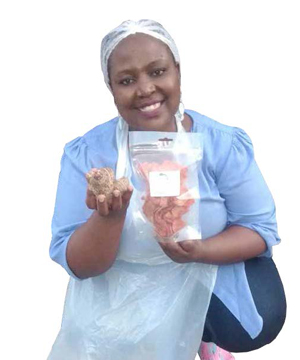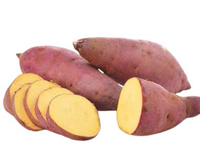A Durban farmer is planting the seeds for rural and township communities to contribute to the local economy, while selling products that offer health benefits.
Sibongile Mtsabe (44) is a thriving farmer who has set her business apart from others by turning indigenous roots into healthy products.
Mtsabe, from Durban in KwaZulu-Natal, founded Sibocali Traders, which operates as Sibocali Foods, in 2009. The company specialises in processing indigenous roots and turning them into crispy chips, gluten-free flour, low-carb flour, instant porridge, vegetable oils and herbal tea, among others. Sibocali Foods uses indigenous roots like cassava, amadumbe, sweet potato and tiger nuts for its products.
 Mtsabe, who has a Bachelor of Technology in Marketing degree from the Cape Peninsula University of Technology as well as qualifications in multimedia and project management, said she started her farming journey by doing research.
Mtsabe, who has a Bachelor of Technology in Marketing degree from the Cape Peninsula University of Technology as well as qualifications in multimedia and project management, said she started her farming journey by doing research.
“In 2009, I did all the research needed to get me started. I chose to make amadumbe, sweet potato, tiger nuts, cauliflower, turnip and cassava products because there is a growing need for alternative functional foods in South Africa and globally,” she explained.
Functional foods provide health benefits in addition to their nutritional value.
With the assistance from the KwaZulu-Natal Department of Agriculture and Rural Development, Mtsabe has employed six people at her company. “Government purchased some of the processing equipment being used in our factory, which helped us create jobs. When we started, it was just a team of two people.
“The assistance from government has helped us expand our capacity and product offering,” she said.
Mtsabe also expanded her knowledge through various incubation programmes by Indalo Inclusive, Land Accelerator Program, Trade and Investment KwaZulu- Natal, the Small Enterprise Development Agency (Seda) and the Informal Economy Support Programme.
Indigenous roots
Mtsabe said she chose to focus on indigenous roots because apart from the health benefits, she also wanted to educate communities about the importance of food security and help them to start their own farms.
“Our vision is to play a significant role in the eco- nomic development of rural and township communities using agriculture as a means to generate income and empower generations in Africa. “Eating healthy means living healthy and comfortably. We encourage healthy snacking, which will assist those with diabetes, ensure nutritional balance and reduce obesity,” she said.
Mtsabe’s company works with communities in the Western Cape and KwaZulu- Natal, as well as youth and women smallholder farmers who sell produce that is grown naturally.
She said it has not been easy accessing indigenous crops due to a lack of supply because they are produced on a small-scale.
“Getting cassava, amadumbe and tiger nuts has not been easy, as people plant these mainly for consumption,” she explained.
Mtsabe is now building a database of farmers to supply with seedlings and she will eventually buy produce from these farmers.
“Being a unique agro-processor means we will need more farmers in our communities to supply produce. This will increase economic involvement in rural and township communities,” she said.
Mtsabe added that increasing the number of farmers will reduce unemployment, while people will have access to healthy organic food, which is processed locally and sustainable.
She said another challenge was having to train farmers to understand their role in the value chain. 
“We decided to source our raw material locally because we believe in financially independent rural and township communities. We are passionate about our community development,” she said.
Mtsabe has encouraged fellow women entrepreneurs to follow their dreams. “That thought you have, do not dismiss it. That passion you have, do not suppress it. Overcome the fear and be courageous enough to make your dream work. When you do so, the whole community will thrive,” she said.
The KwaZulu-Natal Department of Agriculture and Rural Development can be reached on www.kzndard.gov.za
For more information about the Seda visit www.seda.org.za



 Facebook
Facebook Twitter
Twitter WhatsApp
WhatsApp